On Wednesday Jan. 27th CMMPH PhD student Preeti Mahato will present her PhD research ideas under the title “Addressing quality of care and equity of services available at birthing centres to improve maternal and neonatal health in western Nepal.” Her presentation will be held at the Lansdowne Campus at 13.00 in room 301 in Royal London House.
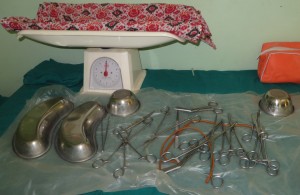 Preeti’s research focuses on birthing centres in western Nepal; and quality and equity of service available at these facilities. In Nepal, birthing centres act as first contact point for the women seeking maternity services especially the basic obstetric care. The focus of this presentation will be to talk about the first review article Preeti Mahato wrote for the ‘Journal of Asian Midwives’ entitled “Birthing centres in Nepal: Recent development, obstacles and opportunities”. The article has been accepted for publication in June 2016 and focuses on introducing birthing centres, their current state of operation under the health system of Nepal, barriers they are facing and what could be done to improve their present state. The quality of care issue available at birthing centre is emphasised, since the number of these facilities are increasing however there is a growing trend to bypass and uptake services at hospitals. Despite barriers to utilisation of services at birthing centres, they can play an important role in increasing institutional delivery rate and proportion of births benefiting from a skilled birth attendant.
Preeti’s research focuses on birthing centres in western Nepal; and quality and equity of service available at these facilities. In Nepal, birthing centres act as first contact point for the women seeking maternity services especially the basic obstetric care. The focus of this presentation will be to talk about the first review article Preeti Mahato wrote for the ‘Journal of Asian Midwives’ entitled “Birthing centres in Nepal: Recent development, obstacles and opportunities”. The article has been accepted for publication in June 2016 and focuses on introducing birthing centres, their current state of operation under the health system of Nepal, barriers they are facing and what could be done to improve their present state. The quality of care issue available at birthing centre is emphasised, since the number of these facilities are increasing however there is a growing trend to bypass and uptake services at hospitals. Despite barriers to utilisation of services at birthing centres, they can play an important role in increasing institutional delivery rate and proportion of births benefiting from a skilled birth attendant.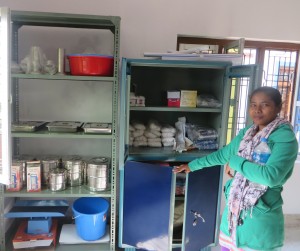
The second part of presentation will provide a brief summary on what Preeti has done since writing a review article, as she has worked on a systematic review on quality of basic obstetric care facilities in low and middle income countries.
Preeti Mahato has worked in the field of public health in Nepal for three years after completing her Master of Public Health. She has an interest in sexual and reproductive health, women’s health and maternal and child health. Working as a public health officer she was involved in maternal and neonatal health that developed her interest in pursuing a doctorate related to maternal and neonatal health. Part of her work in Nepal also included monitoring and supervision of birthing centres in rural areas of Nepal and that is how she became motivated to start a PhD at BU.
Prof. Edwin van Teijlingen
CMMPH
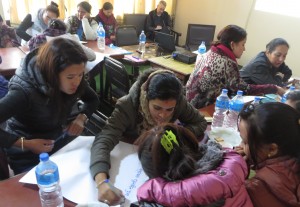
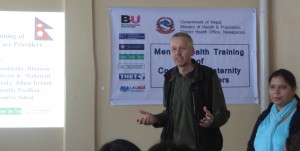

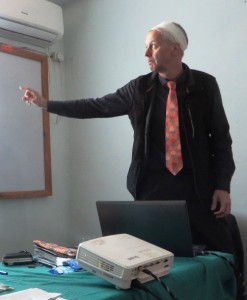
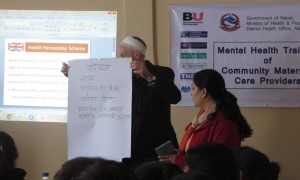
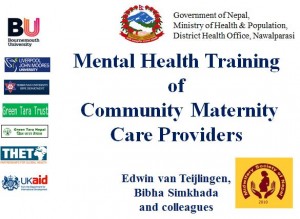
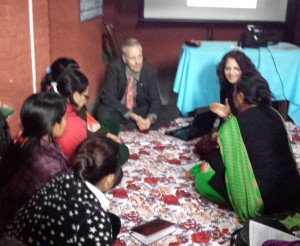
 with BU on a range of health and maternity-care projects. The birthing centre has been improved since our last visit one year ago. There now is a newly build decomposition pit for the disposal of placentas. There is a new postnatal recovery room, and the number of local women giving birth in the facility has been increasing! When we arrived a new baby had just been born an hour or so earlier (second photo with proud father on the right).
with BU on a range of health and maternity-care projects. The birthing centre has been improved since our last visit one year ago. There now is a newly build decomposition pit for the disposal of placentas. There is a new postnatal recovery room, and the number of local women giving birth in the facility has been increasing! When we arrived a new baby had just been born an hour or so earlier (second photo with proud father on the right).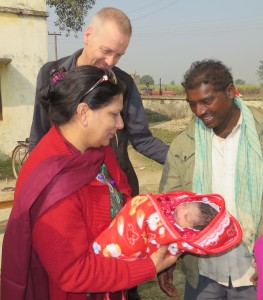


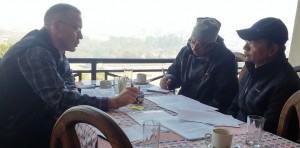
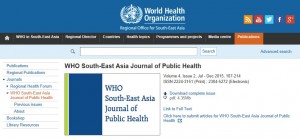

 This afternoon Prof. Jonathan Parker introduced the final of three session in the Executive Business Centre under the title ‘Enhancing social life through global social research: Part 3. Social science research in diverse communities’. This session was well attended and coveredwas a wide-range of interesting social science research topics.
This afternoon Prof. Jonathan Parker introduced the final of three session in the Executive Business Centre under the title ‘Enhancing social life through global social research: Part 3. Social science research in diverse communities’. This session was well attended and coveredwas a wide-range of interesting social science research topics.


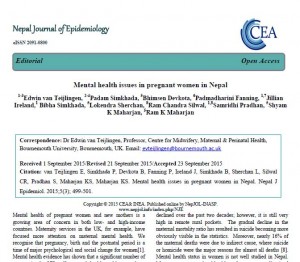


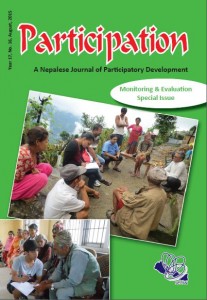
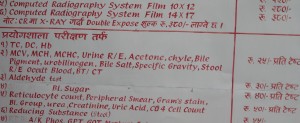

 Today I attended a contract-signing meeting at the Department of Health, Physical and Population Education at Nepal’s oldest university, Tribhuvan University (TU).
Today I attended a contract-signing meeting at the Department of Health, Physical and Population Education at Nepal’s oldest university, Tribhuvan University (TU). Midwives (ANMs) about the key mental health issues in pregnancy and in the months after birth. A local charity Green Tara Nepal (GTN) will support the work through some of the curriculum design, sensitising UK volunteers to live in rural Nepal, assisting in translating, as well as helping to recruit the local health workers. The two UK universities have a long history of working with GTN as well as its sister organisation Green Tara Trust (GTT), a Buddhist charity based in London. The new project will be based in Nawalparasi in the sub-tropical part of the country bordering India. The target population consists of grassroot health care practitioners since there are no doctors in these rural villages.
Midwives (ANMs) about the key mental health issues in pregnancy and in the months after birth. A local charity Green Tara Nepal (GTN) will support the work through some of the curriculum design, sensitising UK volunteers to live in rural Nepal, assisting in translating, as well as helping to recruit the local health workers. The two UK universities have a long history of working with GTN as well as its sister organisation Green Tara Trust (GTT), a Buddhist charity based in London. The new project will be based in Nawalparasi in the sub-tropical part of the country bordering India. The target population consists of grassroot health care practitioners since there are no doctors in these rural villages.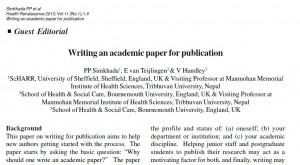
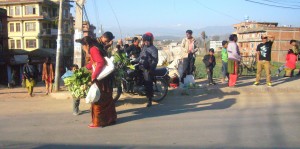
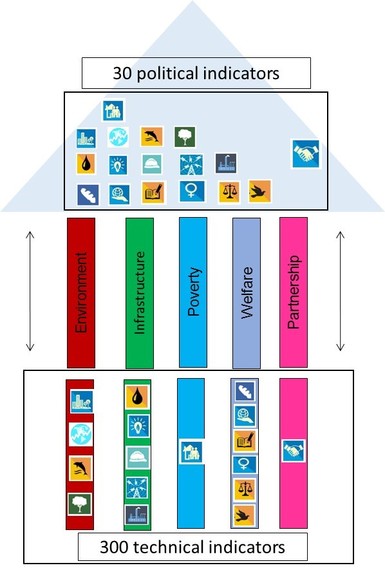
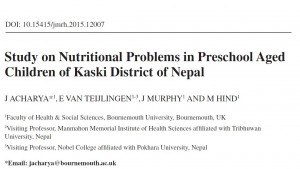
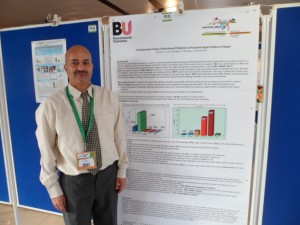
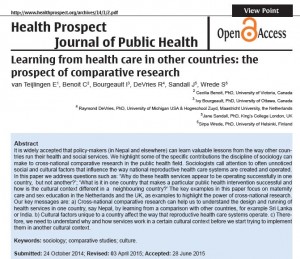












 Seeing the fruits of your labour in Bangladesh
Seeing the fruits of your labour in Bangladesh Exploring Embodied Research: Body Map Storytelling Workshop & Research Seminar
Exploring Embodied Research: Body Map Storytelling Workshop & Research Seminar Marking a Milestone: The Swash Channel Wreck Book Launch
Marking a Milestone: The Swash Channel Wreck Book Launch No access to BRIAN 5-6th February
No access to BRIAN 5-6th February ECR Funding Open Call: Research Culture & Community Grant – Application Deadline Friday 12 December
ECR Funding Open Call: Research Culture & Community Grant – Application Deadline Friday 12 December MSCA Postdoctoral Fellowships 2025 Call
MSCA Postdoctoral Fellowships 2025 Call ERC Advanced Grant 2025 Webinar
ERC Advanced Grant 2025 Webinar Update on UKRO services
Update on UKRO services European research project exploring use of ‘virtual twins’ to better manage metabolic associated fatty liver disease
European research project exploring use of ‘virtual twins’ to better manage metabolic associated fatty liver disease